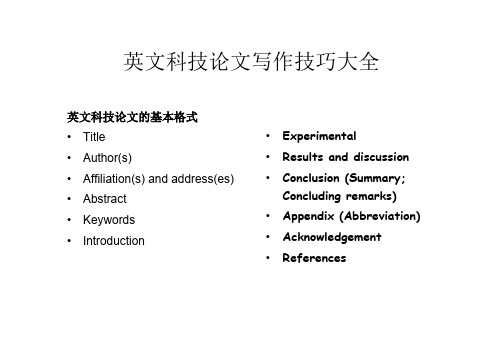科学论文英文写作..
- 格式:ppt
- 大小:274.00 KB
- 文档页数:34

英语科学与自然作文Science and Nature。
Science and nature are two interconnected and fascinating subjects that have captured the imaginations of people for centuries. Science is the study of the natural world and the laws that govern it, while nature encompasses everything from the smallest microorganisms to the vast expanses of the universe. The study of science and nature is essential to our understanding of the world around us and has led to many technological advancements that have improved our lives.One of the most significant areas of scientific study is biology, which is the study of living organisms. Through the study of biology, we have learned about the complex systems that make up living organisms, from the smallest cells to the largest animals. We have also learned about the interconnectedness of all living things and thedelicate balance that exists in nature.Another important area of scientific study is physics, which is the study of matter and energy. Through the studyof physics, we have learned about the fundamental laws that govern the universe, such as the laws of motion and thelaws of thermodynamics. We have also learned about the nature of light and other forms of radiation, which has led to many technological advancements, such as the development of lasers and other forms of medical technology.Chemistry is another important area of scientific study, which is the study of the properties and behavior of matter. Through the study of chemistry, we have learned about the structure of atoms and molecules and how they interact with each other. We have also learned about the chemicalreactions that occur in nature and how they can be harnessed to create new materials and technologies.The study of science and nature is not just importantfor our understanding of the world around us, but it isalso essential for our survival as a species. As wecontinue to face challenges such as climate change,pollution, and overpopulation, it is essential that we use our knowledge of science and nature to find solutions to these problems. We must also continue to explore the mysteries of the universe and push the boundaries of what we know to unlock new technologies and advancements that can improve our lives.In conclusion, the study of science and nature is essential for our understanding of the world around us and has led to many technological advancements that have improved our lives. We must continue to explore these subjects and use our knowledge to find solutions to the challenges we face as a species. With continued study and exploration, we can unlock the mysteries of the universe and create a better future for ourselves and future generations.。




科学与技术英文作文英文:Science and technology play an important role in our daily lives. They have brought us convenience and improved our quality of life. Science is the study of the natural world through observation and experiment, while technology is the application of scientific knowledge for practical purposes.Science has helped us understand the world around us. For example, the discovery of antibiotics has saved countless lives by fighting off infections. The study of genetics has allowed us to understand the causes of diseases and develop treatments for them. In addition, science has helped us understand the environment and the impact of human activities on it.Technology has also greatly impacted our lives. It has made communication faster and easier, allowing us toconnect with people all over the world. We can now access vast amounts of information through the internet, and we can use technology to improve our health and fitness. For example, wearable fitness trackers can help us track our exercise and monitor our heart rate.However, science and technology also have their downsides. The overuse of technology can lead to addiction and social isolation. The development of weapons and other harmful technologies can lead to war and destruction. We must use science and technology responsibly and ethically to avoid these negative consequences.中文:科学与技术在我们日常生活中扮演着重要的角色。

英文科技论文写作技巧大全英文科技论文的基本格式•Title•Author(s)•Affiliation(s) and address(es) •Abstract•Keywords•Introduction •Experimental •Results and discussion •Conclusion (Summary;Concluding remarks) •Appendix (Abbreviation)•Acknowledgement •References2.基本要求(1)Title长短适中,概括性强,重点突出,一目了然。
(2)Author(s)姓氏和名字要容易弄清楚,以免发生以名代姓。
(3)Affiliation(s) and address(es)准确清楚,使读者能按所列信息顺利地与作者联系。
(4)Abstract不宜太详尽,也不宜太简短,应将论文的研究体系、主要方法、重要发现、主要结论等,简明扼要地加以概括。
不要将结论与提要重复使用。
(5)Introduction说明本研究的目的意义。
归纳与本研究密切相关的前人研究结果及有关文献,指出本研究与前人研究的不同之处。
说明本论文要解决的问题及方法、手段等。
不宜将本论文的结果在“绪论”中叙述。
(6)Experimental叙述主要的实验过程、方法、仪器设备、试剂来源及规格等。
不宜将实验结果在“实验部分”中叙述。
(7)Results and discussion是论文的核心部分,要求:–数据及图表的内容及含义交代清楚,有条理;–对数据及现象的归纳、演绎、解释、立论要有逻辑性、自洽性。
–语句要准确、流畅、多样化,不宜重复使用相同的句型和词汇。
(8)Conclusion (Summary, Concluding remarks)简明扼要地归纳出本论文的新发现、新观点、新理论等。
不宜将“结果及讨论”部分的语句直接抄录作为结论。
(9)References要按所投杂志规定的格式准确书写。
科学家关于科学的英语作文标题,Scientist's Perspective on Science。
Science, the pursuit of knowledge through observation, experimentation, and reasoning, has been the cornerstone of human progress for centuries. Scientists, the torchbearers of this noble endeavor, play a pivotal role in unraveling the mysteries of the universe and improving the quality of human life. In this essay, we delve into the perspectives of scientists regarding science, its significance, challenges, and future prospects.To scientists, science is not merely a profession but a passion, a relentless quest for truth and understanding. It is a systematic approach to deciphering the complexities of nature, from the microscopic world of atoms to the vast expanse of the cosmos. Through meticulous observation and rigorous experimentation, scientists strive to uncover the underlying principles governing the universe, pushing the boundaries of human knowledge ever further.One of the fundamental principles guiding scientific inquiry is skepticism—the questioning of establishedbeliefs and the constant search for evidence-based explanations. Scientists embrace uncertainty, recognizing that our understanding of the world is always provisional and subject to revision in the face of new evidence. This commitment to intellectual honesty distinguishes science from dogma and superstition, fostering a culture of open inquiry and critical thinking.Moreover, scientists acknowledge the collaborative nature of scientific progress, built upon the contributions of countless individuals across generations and disciplines. Collaboration fosters creativity and innovation, as diverse perspectives and expertise converge to tackle complex problems. Through international collaboration andinformation sharing, scientists transcend geographical and cultural boundaries, advancing collective knowledge for the betterment of humanity.However, the pursuit of science is not without itschallenges. Funding constraints, bureaucratic hurdles, and societal skepticism pose formidable obstacles to scientific research. In an era of competing priorities and limited resources, scientists must advocate for robust investment in research and education, emphasizing the long-term benefits of scientific discovery for society as a whole.Furthermore, scientists grapple with ethical dilemmas arising from the misuse of scientific knowledge and technology. The rapid pace of technological advancement raises concerns about the unintended consequences of scientific innovation, from environmental degradation to the erosion of privacy and autonomy. Scientists bear a moral responsibility to consider the broader implications of their research and engage in dialogue with policymakers and the public to ensure that scientific progress is guided by ethical principles and social values.Looking ahead, scientists are optimistic about the future of science, buoyed by recent advances in fields such as artificial intelligence, biotechnology, and renewable energy. These breakthroughs hold the promise of addressingsome of humanity's most pressing challenges, from climate change and disease to poverty and inequality. However, realizing this potential will require sustained investment in research, education, and infrastructure, as well as a commitment to fostering a diverse and inclusive scientific community.In conclusion, science occupies a central place in the collective human endeavor to understand the world and improve the human condition. Scientists approach their work with humility, curiosity, and a sense of duty to advance knowledge and benefit society. Despite the challenges they face, scientists remain steadfast in their commitment to the pursuit of truth and the betterment of humanity through science.With these perspectives in mind, it is evident that science will continue to shape the course of human history, unlocking new frontiers of knowledge and innovation for generations to come. As we confront the complex challenges of the 21st century, the wisdom and dedication ofscientists will be more indispensable than ever in guiding us toward a brighter future.。
科普实验英文作文模板英文:Science experiments are a great way to learn about the world around us. As someone who loves science, I have tried many experiments that have taught me a lot. One of my favorite experiments is the classic baking soda and vinegar volcano. This experiment is not only fun, but it also teaches us about chemical reactions.To do this experiment, you will need baking soda, vinegar, a container, and some food coloring (optional). First, pour some baking soda into the container. Then, add some vinegar and watch as the mixture fizzes and bubbles.If you want to make it more exciting, you can add some food coloring to make it look like a real volcano.This experiment works because when baking soda and vinegar are mixed together, they create carbon dioxide gas. The gas builds up and causes the mixture to bubble and fizz.This is a chemical reaction that is fun to watch and can teach us about chemistry.中文:科学实验是了解我们周围世界的好方式。
科学与技术英语作文Title: The Role of Science and Technology in Shaping Our Future。
Science and technology play pivotal roles in shaping the trajectory of our future. From advancements in medicine to innovations in communication, these fields continuously propel humanity forward, offering solutions to complex challenges and opening new frontiers of possibility. Inthis essay, we will explore the multifaceted impacts of science and technology on society, economy, and the environment.First and foremost, science and technologyrevolutionize healthcare. Breakthroughs in medical research have led to the development of vaccines, treatments, and diagnostic tools, significantly extending human lifespan and enhancing quality of life. For instance, the rapid development of mRNA vaccine technology during the COVID-19 pandemic showcased the power of scientific innovation incombating global health crises. Moreover, advancements in gene editing technologies like CRISPR hold the promise of curing genetic diseases and revolutionizing personalized medicine.Furthermore, technology drives economic growth and fosters innovation. The rise of digital technologies, such as artificial intelligence (AI) and blockchain, has transformed industries ranging from finance to manufacturing. AI algorithms optimize supply chains, increase productivity, and enable predictive analytics, enhancing the efficiency of businesses worldwide. Additionally, the proliferation of e-commerce platforms and digital marketplaces has reshaped consumer behavior and expanded opportunities for entrepreneurship. As we continue to harness the potential of technology, economies become increasingly interconnected and resilient.However, the rapid pace of technological advancement also raises ethical and societal concerns. The advent of automation and AI threatens job displacement, exacerbating socioeconomic inequality and necessitating reevaluation ofeducation and workforce development strategies. Moreover, issues surrounding data privacy, algorithmic bias, and cybersecurity pose significant challenges to theresponsible deployment of technology. It is imperative that as we embrace innovation, we also prioritize ethical considerations and ensure inclusivity in the design and implementation of technological solutions.In addition to societal impacts, science and technology play a critical role in addressing environmental challenges. Climate change, pollution, and resource depletion require interdisciplinary approaches and technologicalinterventions to mitigate their adverse effects. Renewable energy technologies such as solar and wind power offer sustainable alternatives to fossil fuels, reducing greenhouse gas emissions and combating climate change. Furthermore, advancements in agricultural biotechnology enable the development of drought-resistant crops and environmentally friendly farming practices, promoting food security while minimizing ecological footprint.In conclusion, science and technology are indispensabledrivers of progress and development in the modern world. From healthcare and economics to environmental sustainability, the impacts of scientific innovation are profound and far-reaching. However, with great power comes great responsibility, and it is incumbent upon us to harness the potential of technology for the betterment of humanity while addressing its ethical, societal, and environmental implications. Only through informed decision-making and collaboration can we navigate the complexities of the future and build a more equitable and sustainable world for generations to come.。